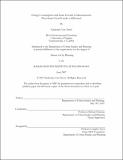Energy consumption and smart growth in Massachusetts : does smart growth make a difference?
Author(s)
Van Tassel, Katherine
DownloadFull printable version (7.888Mb)
Other Contributors
Massachusetts Institute of Technology. Dept. of Urban Studies and Planning.
Advisor
Michael Flaxman.
Terms of use
Metadata
Show full item recordAbstract
With the environmental crisis involving climate change fast approaching, all potential mitigation techniques must be explored and implemented. A key approach comes from the power towns and cities have to influence land use and building standards in their jurisdiction. This thesis uses a scenario planning approach to explore the energy implications of four potential futures for the town of Littleton, MA. Four scenario storylines (Business as Usual (BAU), Baby Steps (high residential density, no mixing), Mixed Use Village (higher residential density, mixed uses), and Thoroughly Green (similar to Mixed Use Village with added green building requirements)) were used to frame the potential outcomes. Typical development typologies from nearby Massachusetts towns served as proxies for the scenarios. Using an elasticity method based on the density, diversity and design of the typologies, the reduction in Vehicle Miles Traveled (VMT) for each alternative scenario as compared to the BAU scenario was calculated and used to determine the reduction in gasoline usage and CO2 emissions. Local and regional average electricity and heating values were used to calculate the home energy consumption for each scenario. (cont.) The Baby Steps and Mixed Use Village/Thoroughly Green scenarios reduced VMT by 14% and 32%, respectively. The Baby Steps scenario used 45% less electricity, the Mixed Use Village used 55% less, and the Thoroughly Green scenarios used 65% less than the BAU scenario. The annual cost savings per capita from the above energy savings run from $321 to $737 for transportation and CO2 reduction, and $242 to $408 for housing energy consumption. The total savings per capita run from $563-$1,145. The total savings for the hypothetical development are $1.2 million to $2.4 million. Policy makers should take the results of this scenario analysis to support the inclusion of energy implications in land use planning. Recommended measures include requiring an energy section in master plans, providing state-wide technical support for these plans, supporting processes to incorporate energy considerations in public planning processes, and funding for further research into the quantification of the energy land use connection and what steps towns can take to address it.
Description
Thesis (M.C.P.)--Massachusetts Institute of Technology, Dept. of Urban Studies and Planning, 2007. This electronic version was submitted by the student author. The certified thesis is available in the Institute Archives and Special Collections. Includes bibliographical references (p. 61-63).
Date issued
2007Department
Massachusetts Institute of Technology. Department of Urban Studies and PlanningPublisher
Massachusetts Institute of Technology
Keywords
Urban Studies and Planning.